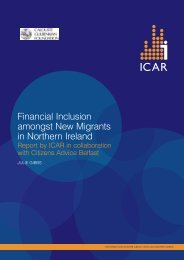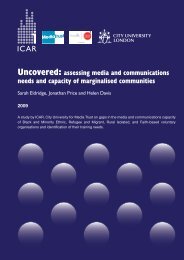The Somali community in the UK: What we know and how we ... - ICAR
The Somali community in the UK: What we know and how we ... - ICAR
The Somali community in the UK: What we know and how we ... - ICAR
You also want an ePaper? Increase the reach of your titles
YUMPU automatically turns print PDFs into web optimized ePapers that Google loves.
I have been here s<strong>in</strong>ce 1983 <strong>and</strong> <strong>the</strong> war<br />
effects [sic] everyone <strong>in</strong> some way, when I th<strong>in</strong>k<br />
about what is happen<strong>in</strong>g I can’t sleep or eat,<br />
you feel sick. Your body is here but your bra<strong>in</strong><br />
is not… When people came here <strong>the</strong>y <strong>we</strong>re<br />
expect<strong>in</strong>g a better life <strong>and</strong> <strong>the</strong>y have not got it.<br />
(Bullivant et al, 1995: 14)<br />
Underst<strong>and</strong><strong>in</strong>g <strong>the</strong>se problems from <strong>the</strong> <strong>in</strong>side,<br />
much of <strong>the</strong> work around mental illness is be<strong>in</strong>g<br />
undertaken by <strong>Somali</strong>s <strong>the</strong>mselves. Published<br />
research is still th<strong>in</strong> on <strong>the</strong> ground, 118 but several<br />
projects are under way, such as <strong>the</strong> SOMMER<br />
<strong>and</strong> Manchester studies mentioned above. O<strong>the</strong>r<br />
reports authored by British researchers rely on<br />
<strong>Somali</strong> <strong>in</strong>tervie<strong>we</strong>rs. 119 Until now, <strong>the</strong> bias <strong>in</strong><br />
<strong>Somali</strong> health research has been towards areas<br />
such as To<strong>we</strong>r Hamlets which, although it has a<br />
refugee population, is based on <strong>the</strong> older settler<br />
communities. It is to be hoped that <strong>in</strong>vestigation<br />
will also take place <strong>in</strong> <strong>the</strong> area of more recent<br />
arrivals from <strong>the</strong> <strong>Somali</strong> diaspora. As <strong>we</strong> have seen,<br />
needs change with generation <strong>and</strong> circumstance.<br />
But <strong>the</strong> East End of London also enjoys an<br />
outst<strong>and</strong><strong>in</strong>g base for research <strong>in</strong> <strong>the</strong> practical<br />
service provided by Daryeelka Maanka, (‘Support<br />
for <strong>the</strong> M<strong>in</strong>d’) a MIND <strong>in</strong> To<strong>we</strong>r Hamlets project<br />
which provides drop-<strong>in</strong> <strong>in</strong>formation, a lunch<br />
club, <strong>and</strong> social activities, besides <strong>in</strong>dividual<br />
support work <strong>and</strong> advocacy for those with<br />
mental problems, so act<strong>in</strong>g as a bridge bet<strong>we</strong>en<br />
<strong>the</strong> <strong>community</strong> <strong>and</strong> statutory services. 120 <strong>The</strong><br />
Manchester team is also tak<strong>in</strong>g practical action<br />
to deal with ‘worries’ <strong>and</strong> promote ‘<strong>we</strong>llbe<strong>in</strong>g’<br />
- assist<strong>in</strong>g with capacity build<strong>in</strong>g, advis<strong>in</strong>g on <strong>how</strong><br />
to keep warm <strong>and</strong> healthy <strong>in</strong> <strong>the</strong> cold <strong>and</strong> <strong>we</strong>t, <strong>and</strong><br />
creat<strong>in</strong>g l<strong>in</strong>ks with Cumbrian farmers to provide<br />
halal milk <strong>and</strong> meat for <strong>the</strong> <strong>Somali</strong> <strong>community</strong>. As<br />
with counsell<strong>in</strong>g, with <strong>the</strong> comb<strong>in</strong>ation of problem<br />
solv<strong>in</strong>g <strong>and</strong> <strong>the</strong>rapy action research provides an<br />
effective forum for collect<strong>in</strong>g data.<br />
Both projects also provide help with access<strong>in</strong>g<br />
services. One fact that emerged from Gabriel<br />
<strong>and</strong> Ritchie’s study <strong>in</strong> To<strong>we</strong>r Hamlets is <strong>the</strong><br />
overrepresentation of <strong>Somali</strong>s <strong>in</strong> psychiatric wards,<br />
with a high <strong>in</strong>cidence of section<strong>in</strong>g (2002: 23).<br />
While this could be related to <strong>in</strong>stitutional racism<br />
<strong>in</strong> <strong>the</strong> mental health sector, it also may reflect <strong>the</strong><br />
lack of access to preventative measures <strong>and</strong> early<br />
treatment. <strong>The</strong>re are several factors that <strong>in</strong>hibit<br />
contact with <strong>the</strong> appropriate services. Apart from<br />
patchy provision, <strong>Somali</strong> refugees may not <strong>know</strong><br />
what does exist nor underst<strong>and</strong> its potential<br />
relevance to <strong>the</strong>m. <strong>The</strong>y may not have sufficient<br />
comm<strong>and</strong> of English to approach professionals, or<br />
access to an advocate to speak on <strong>the</strong>ir behalf. <strong>The</strong><br />
cultural factors operat<strong>in</strong>g with<strong>in</strong> <strong>the</strong> <strong>community</strong><br />
have been already mentioned - <strong>the</strong> stigma attached<br />
to mental <strong>in</strong>stability, especially for men, means that<br />
admission of psychological problems may carry a<br />
high social risk. In addition, asylum seekers worry<br />
that a dem<strong>and</strong> on services might affect <strong>the</strong>ir claim.<br />
Even more difficult is to ensure that young<br />
<strong>Somali</strong>s with emotional problems have access to<br />
appropriate help before descend<strong>in</strong>g <strong>in</strong>to a spiral of<br />
despair. <strong>The</strong> most severe cases of trauma are found<br />
<strong>in</strong> those who have had first h<strong>and</strong> experience of<br />
violence. <strong>The</strong> children <strong>in</strong>tervie<strong>we</strong>d <strong>in</strong> <strong>the</strong> M<strong>in</strong>ority<br />
Rights Group’s report on <strong>the</strong> impact of war on<br />
children refers specifically to members of m<strong>in</strong>ority<br />
clans, but found that o<strong>the</strong>r <strong>Somali</strong> children <strong>in</strong><br />
London similarly suffered nightmares <strong>and</strong> o<strong>the</strong>r<br />
signs of trauma six years after leav<strong>in</strong>g <strong>Somali</strong>a<br />
(MRG, 1997: 26). O<strong>the</strong>r particularly vulnerable<br />
children are those sent over to <strong>the</strong> <strong>UK</strong> alone<br />
by <strong>the</strong>ir parents <strong>in</strong> <strong>the</strong> hope that <strong>the</strong>y will be<br />
educated. 121 <strong>The</strong> effects of separation are often<br />
compounded by abuse; this testimony of a S<strong>we</strong>dish<br />
psychologist work<strong>in</strong>g with separated children also<br />
applies to <strong>the</strong> <strong>UK</strong>:<br />
115. Over half of <strong>the</strong> <strong>Somali</strong> enquiries at <strong>the</strong> Hill<strong>in</strong>gdon Citizens Advice<br />
Bureau April-September 2002 concerned benefits; nearly a quarter <strong>we</strong>re<br />
about hous<strong>in</strong>g. Both categories <strong>we</strong>re higher for <strong>Somali</strong>s than o<strong>the</strong>r clients<br />
(Elmi <strong>and</strong> Brown, 2002).<br />
116. Interview, 22.7.03.<br />
117. <strong>The</strong> project staff are campaign<strong>in</strong>g around this issue, which is also<br />
be<strong>in</strong>g addressed elsewhere, such as by refugee-run employment projects <strong>in</strong><br />
West London. See Lukes <strong>and</strong> Bell, 2002: 99.<br />
118. E.g. Bullivant et al (1995).<br />
119. E.g. Gabriel <strong>and</strong> Ritchie (2002).<br />
120. Interview with project workers Muna Ismael <strong>and</strong> Abdirashid Gulaid,<br />
22.7.03. For details of <strong>the</strong>se services see <strong>the</strong> evaluation by Gabriel <strong>and</strong><br />
Ritchie (2002).<br />
121. See above p. 57<br />
<strong>The</strong> <strong>Somali</strong> <strong>community</strong> <strong>in</strong> <strong>the</strong> <strong>UK</strong><br />
57

















